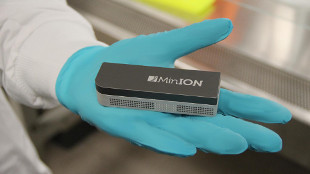 BIOMED CENTRAL, ANDREW KILIANSKI
BIOMED CENTRAL, ANDREW KILIANSKI
A hand-held DNA sequencer can be used to distinguish between particular strains of bacteria and viruses in as little as six hours, according to a study published this week (March 26) in GigaScience.
Oxford Nanopore Technologies’s MinION was the first nanopore sequencing device made available for independent assessment. The USB-powered sequencer contains thousands of wells, each containing nanopores—narrow protein channels that are only wide enough for a single strand of DNA. When DNA enters the channels, each base gives off a unique electronic signature that can be detected by the system, providing a readout of the DNA sequence.
To test the applicability of the device for disease detection in remote areas, researchers from the Edgewood Chemical Biological Center in Maryland, the Defense Threat Reduction Agency ...
















